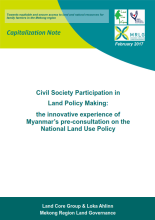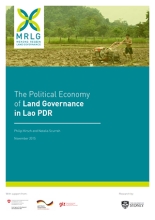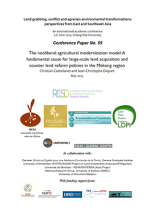Land Library
Welcome to the Land Portal Library. Explore our vast collection of open-access resources (over 74,000) including reports, journal articles, research papers, peer-reviewed publications, legal documents, videos and much more.
/ library resources
Showing items 1 through 7 of 7.Most of the land in sub-Saharan Africa is governed under various forms of customary tenure. Over the past three decades a quiet paradigm shift has been taking place transforming the way such landl is governed.
We analyze the impact of land fragmentation on production diversification in rural Albania. Albania represents a particularly interesting case for studying land fragmentation as the fragmentation is a direct outcome of land reforms.
In October 2014, for the first time in recent history, the government of Myanmar decided to organize a public consultation to inform the development of a national policy.
All four countries in continental South-East Asia featured in this paper (Myanmar, Cambodia, Laos and Vietnam) are experiencing land conflicts that could potentially destabilise their governments.1 Thailand is in a similar situation in many respects, as it has faced mounting tensions over land te
This country level analysis addresses land governance in Laos in two ways. First, it summarises what the existing body of knowledge tells us about power and configurations that shape access to and exclusion from land, particularly among smallholders, the rural poor, ethnic minorities and women.
This conference paper examines how the ideology and programmatic set of policies coined in the term ‘neoliberal modernization’ applies to agriculture and practices in the Mekong region.
Based on government statistics and interviews with villagers across Malawi this article argues that customary matrilineal and patrilineal land tenure systems serve to weaken security of land tenure for some family members as well as obstructing the creation of gender-neutral inheritance of lands.





